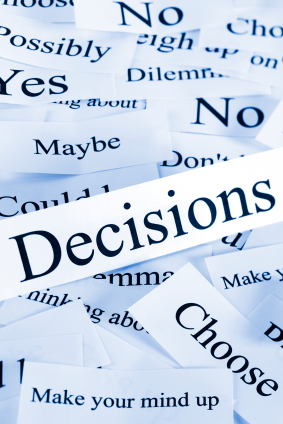Would you have sex for a Super Bowl ticket (with a stranger)? This is what one guy wants in exchange for his highly coveted Super Bowl XLVII ticket.
Or how about swallowing dozens of giant cockroaches for a free python?
Then how about drinking a few gallons of water for a Nintendo Wii?
Guaranteed someone will take the guy up on the tickets. As far as the python and Wii, unfortunately the individuals who both said “yes” to these challenges subsequently died.
Why do we make decisions like this?
For the most part, I’m a pretty risk-averse person. I tend to over-think things before actually making a decision. This can be good or bad depending on the situation and possible outcomes. This isn’t to say I’m not prone to impulsive decisions either:
When I was 13, I stood in line with my best friend for more than six hours to watch the first showing of Return of the Jedi (hey, I was only 13).
In high school, some friends thought it would be fun to go out “egging.” The homeowner and several of their friends caught me and another friend. Thankfully the police rolled by. Put it this way, they had no plans on calling the police.
In college, my car broke down. I went to the Toyota dealership “just to look” and, several hours later, walked away the proud owner of a brand new Toyota truck…at a bargain 19% APR.
As a full-grown man, I left work and drove an hour just to get an autograph and picture taken with my favorite bodybuilder of all time – Lee Labrada.
Maybe if we were C3PO, our decision-making would be rational with a high probability of success. Unfortunately, sometimes we let our emotions hijack the rational side of our brain that says STOP. It’s the same emotion that tells us it’ll be fun to go out egging, eat huge roaches, or flood our body with water.
So how can we make better decisions?
Define the Problem: What exactly are you trying to accomplish? By defining the problem, our mind automatically starts to search for solutions and alternatives. Can’t afford a Wii? Maybe you can get a temporary part-time job or a loan from a family member. I need a car but do I need one today? Maybe I can get a ride or take public transportation for now until I figure things out (instead of buying a brand new car at 19% APR).
Determine the Risk: The two who tragically died performing those stunts probably didn’t think there’d be that much risk involved. I mean, it’s a contest, right? And a business wouldn’t have this contest if there was real danger involved. This is where you need to be disciplined enough to call on your left brain for analysis. In determining the risk, you’ll need…
Sufficient Information: Getting enough information to make a decision is critical. Granted, you may not be able to obtain all the necessary information, but you should get enough to be comfortable. Sufficient information allows us to assess any dangers involved and helps us properly prepare to support a positive outcome.
Avoid Peer Pressure or Overconfidence: Probably two of the biggest reasons for poor decision-making. Having your friends in your ear screaming “do it sissy!” probably doesn’t help when you’re about to undertake something of significant risk (think college fraternity hazing rituals and binge-drinking). Overconfidence is your ego telling you you’re capable of doing things (when you really aren’t) – like swimming in the ocean when you can hardly swim a lap at the YMCA pool.
Listen to Intuition: Call it sixth sense, the voice inside, or guardian angel, your intuition will tell you if something is no good. It’s the warning system that floods your entire body and manifests itself through a racing heart, constricted breathing, and an overall sense of unease (like fight or flight). Your intuition is pretty much always right. It’s usually our ego and peer pressure that shuts it down.
Despite following all of these steps, things can still go badly. That’s OK though. Mistakes, bad decisions, disappointments, and failures are all part of the learning process. In fact, no matter the outcome, it serves as a reference point from which to draw upon in the future…which will ultimately help us become better decision-makers.
How do you avoid making poor decisions?



